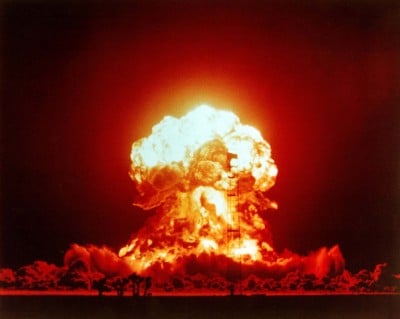Nuclear Madness, “Nuclear Roulette” and US First Strike Military Doctrine

As long as these weapons exist, one day they could be used with devastating effects, risking almost certain doom or close to it.
The only way to prevent eventual nuclear war is by eliminating these weapons entirely, the world community uniting on this most vital of all issues to save life on earth from possible extinction.
Nuclear roulette assures losers, not winners. Einstein said splitting the atom “changed everything save our modes of thinking, and thus we drift toward unparalleled catastrophe.”
Bush/Cheney’s December 2001 Nuclear Posture Review (NPR), asserted the preemptive right to unilaterally declare and wage future wars using first strike nuclear weapons. Madness remains US policy.
Obama’s 2010 and 2015 National Security Strategies pledged US first-strike use of nuclear weapons against any adversary, nuclear armed or not.
Last year, he approved a $1 trillion program to upgrade America’s arsenal over the next 30 years, assuring other nuclear powers will follow suit.
A nuclear arms race increases the risk of these weapons being used, especially given America’s permanent war policy, targeting all sovereign independent states for regime change.
Instead of stepping back from the brink, president-elect Trump tweeted “(t)he United States must greatly strengthen and expand its nuclear capability until such time as the world comes to its senses regarding nukes.”
US belligerence poses an unparalleled nuclear threat, the only nation ever using them in combat, indicating likely willingness to use them again, instead of taking the lead in initiating efforts to abolish these weapons once and for all – although the technology to produce them will always exist. The atom cannot be unsplit.
During his phone conversation with Vladimir Putin, Trump rejected Obama’s 2010 New START Treaty with Russia, according to Reuters.
It capped US and Russian deployment of nuclear warheads. Trump called it “a bad deal for the United States, according to two US officials and (a) former (one) with knowledge of the call,” Reuters reported.
The treaty became effective in February 2011, expected to remain in force until at least 2021. Putin suggested extending it beyond that time frame.
Both countries have until February 2018 to reduce their nuclear arsenals to a maximum 1,550 warheads. It limits deployment of land, air, sea and subsurface nuclear weapons.
It doesn’t eliminate their weapons, nor new propulsion and delivery technological research to be able strike targets anywhere on earth in less than an hour with nuclear or non-nuclear warheads.
No global strike capabilities are compromised, nor constraints on nuclear arms modernization.
Candidate Trump said Russia “outsmarted” us, incorrectly claiming it’s allowed to continue producing nuclear weapons while America cannot.
During his confirmation hearing, Secretary State Tillerson said he supports New START, adding it’s important for Washington to “stay engaged with Russia, hold them accountable to commitments made under the New START, and also ensure our accountability as well.”
A transcript of Trump’s conversation with Putin remains classified. Reuters got its information from administration sources knowledgeable about what both leaders discussed.
Stephen Lendman lives in Chicago. He can be reached at [email protected].
His new book as editor and contributor is titled “Flashpoint in Ukraine: How the US Drive for Hegemony Risks WW III.”
http://www.claritypress.com/LendmanIII.html
Visit his blog site at sjlendman.blogspot.com.
Listen to cutting-edge discussions with distinguished guests on the Progressive Radio News Hour on the Progressive Radio Network.

